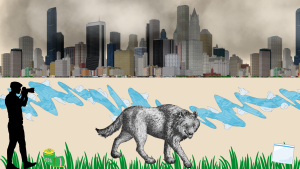
Things are getting worse quickly. Though it does not have to be that way, we cannot make it better by ignoring it all—and it kind of feels like we are. All around us are signs that our current way of life is unsustainable, and educating ourselves to fit that way of life feels irresponsible. It feels as though we are being prepared for a non-existent future.
If Rollins’ mission is to educate students for global citizenship and responsible leadership, there must be a concerted effort in our curriculum to turn students into leaders of adaptation and mitigation—even in the arts and humanities, and especially in business.
A global ecological crisis is here, and it has been for a long time. The egrets, anghingas, and squirrels that dart around Rollins’ campus are more survivors of a continuing apocalypse than they are signs of a flourishing ecosystem. Insect populations are declining dramatically, with bird populations following.
Fish stocks, and aquatic ecosystems at large, are in peril from ruthless overfishing, rising ocean temperatures, plastic and chemical pollutants, and acidification.
Experts project that the we might run out of topsoil in less than a century if current practices continue. Everyone’s food and poop is full of plastic. The Gulf of Mexico is a shadow of its former self. The Everglades are on their last leg. The list goes on. Much of the devastation can be traced back to the structure of our society. Change must come soon. It must come from us.
Not to mention the elephant in the room: the climate. The Camp Fire earlier this month is a grim reminder that climate-change-related catastrophes are already upon us—a sad fact admitted in the National Climate Assessment released on Black Friday.
As survivors flee from their burned out homes and face disease and desperation in the tent cities that have popped up in parking lots of Chico, Calif., we see Climate Refugees in one of the richest countries in the world—a glimpse into the chaotic future that we are barreling toward.
The Intergovernmental Panel on Climate Change report gave humanity 12 years to slash emissions to keep warming to 1.5 degrees Celsius, which would still expose 132.5 million people to severe drought, displace eight percent of plants from half of their climatic range, and negatively impact most crops.
This past July, the National Highway Travel Safety Administration predicted a 7 degrees Celsius rise in global temperatures by 2100, which would be—and this can’t be stressed enough—absolutely catastrophic.
When the United States Government is warning about continued growth, you know things are bad.
Rather than waiting around for, as of yet, non-existent technologies to mitigate our current crisis, we ought to devote the bulk of our focus to changing our collective habits and systems of production, and that starts with education.
I am not sure exactly how the Rollins experience should change to reflect whatever radically different future we are heading for; I just want to express that I am worried and I hope I am not the only one. Continuing on like normal is beginning to feel insane to me.
It is up to our generation to adapt for and to mitigate our climate crisis, and that must be reflected in our education.






Be First to Comment